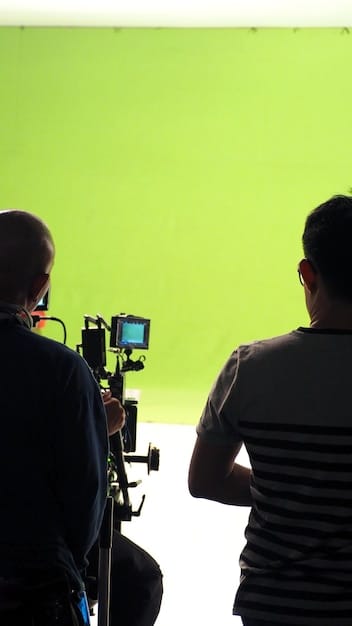Documentary Ethics: Controversial Films Examined

Documentary Filmmaking Ethics: A Critical Look at 3 Controversial Releases examines the ethical dilemmas faced by filmmakers through the lens of three specific documentaries that sparked significant debate.
The world of documentary filmmaking navigates a complex tightrope walk, balancing the pursuit of truth with the inherent power of storytelling. Documentary Filmmaking Ethics: A Critical Look at 3 Controversial Releases reveals the difficult questions surrounding authenticity, consent, and the impact on subjects’ lives.
The Ethics of Representation in Documentary Films
Documentaries hold immense power in shaping public perception and understanding of complex issues. But this power comes with a weighty responsibility: the ethical representation of subjects. It’s not just about reporting facts; it’s about how those facts are presented, who controls the narrative, and what consequences arise from the storytelling.
Navigating the complexities of representation involves careful consideration of factors like power dynamics, informed consent, and the potential for harm. Can a filmmaker truly be objective, particularly when dealing with vulnerable populations or sensitive topics?

The Power Imbalance
The director-subject dynamic inherent in documentary filmmaking can create a significant power imbalance. Recognizing and mitigating this imbalance is crucial for conducting ethical research and telling a fair story.
Informed Consent
Obtaining genuine, informed consent is a cornerstone of ethical filmmaking. However, what happens when a participant’s understanding evolves over time or when unforeseen consequences arise from the film’s release?
- Ensuring subjects comprehend their rights and the potential implications of participation.
- Providing ongoing opportunities for subjects to withdraw or modify their consent.
- Addressing potential power imbalances that may influence consent.
Ultimately, ethical representation demands constant self-reflection and a commitment to minimizing harm. It requires filmmakers to actively consider the perspectives and well-being of their subjects throughout the entire filmmaking process.
“Tickled”: Consent and Deception
David Farrier’s “Tickled” begins as a seemingly lighthearted exploration of competitive endurance tickling. However, it spirals into a bizarre and disturbing investigation of online harassment, privacy violations, and the shadowy figure behind a mysterious tickling empire.
While the film initially depicts willing participants engaged in an unusual activity, ethical questions arise about the transparency of the filmmakers, the emotional manipulation involved, and the blurring lines between journalism and exploitation.
The Bait and Switch
The film draws the audience in with the quirky premise of competitive tickling but slowly reveals a darker narrative. Is this approach a necessary hook or a potentially misleading tactic?
Whose Story Is It?
Although Farrier is ostensibly reporting on the tickling competition, the central figure in the organization behind the competition takes center stage as he is constantly trying to shut it down. Is it right to report so heavily on this antagonist?
- Considering the potential for trauma or re-traumatization of subjects.
- Prioritizing the privacy and safety of individuals involved.
- Acknowledging the film’s impact on the subject’s life beyond the screen.
“Tickled” challenges viewers to consider the ethics of filmmaking and the impact of sensationalism on the truth. It underscores the importance of filmmakers’ accountability in safeguarding the well-being of their subjects.
“The Act of Killing”: Re-enactment and Justification
“The Act of Killing” presents a radical and unsettling approach to documenting the Indonesian killings of 1965–66. Director Joshua Oppenheimer invites former death squad leaders to re-enact their crimes in the style of Hollywood films, forcing them to confront their actions in a disorienting and morally complex way.
The ethics of “The Act of Killing” has been hotly debated, focusing on the potential for glorifying violence, the impact on the perpetrators’ victims, and the justification for such a provocative and potentially exploitative approach.
Glorification vs. Exposure
Does the film inadvertently glorify violence by allowing perpetrators to showcase their power and re-imagine their crimes in a cinematic light?
Impact on Victims
How do victims and their families perceive the film’s portrayal of their oppressors? Does it offer a form of justice or inflict further harm?
- Engaging in ongoing dialogue with affected communities.
- Providing support and resources for victims and their families.
- Promoting healing and reconciliation through storytelling.
The director’s choice to include the perpetrator is risky, and can be seen as supporting the people behind it. However, the result can be an excellent way to reveal the truth.
“The Act of Killing” forces viewers to reckon with the horrifying legacy of mass violence and the complex moral landscape of documentary filmmaking. It raises fundamental questions about the responsible portrayal of trauma and the role of art in confronting difficult histories.
“Leaving Neverland”: Accusations and Bias
“Leaving Neverland” presents the accounts of two men, Wade Robson and James Safechuck, who allege they were sexually abused by Michael Jackson as children. The film sparked a global reckoning with Jackson’s legacy, raising critical questions about power dynamics, grooming, and the credibility of survivor narratives.
The documentary has been hotly debated. While some critics praised its unflinching portrayal of abuse, others questioned its objectivity, citing the lack of counter-narratives and the potential for bias in its presentation of evidence.
One-Sided Story
The film provides the views of two subjects. Is it reasonable to only report on that when covering such a large and controversial figure, such as Michael Jackson?
The Burden of Proof
Considering the sensitive nature of the allegations, does the film prioritize emotional impact over legal proof? What are the ethics of presenting unverified accusations as fact?
- Clearly disclosing the filmmaker’s perspective and potential biases.
- Acknowledging the limitations of the narrative and inviting critical engagement.
- Promoting dialogue and understanding across diverse viewpoints.
“Leaving Neverland” shines a light on the difficult subject of reporting on abuse, as well as the effect that the abuse can have on the victims.
“Leaving Neverland” demands careful scrutiny of power, privilege, and the enduring impact of abuse on survivors and society as a whole. It calls on media producers to grapple with the ethics of storytelling and the potential for harm when dealing with sensitive and traumatic subjects.
Balancing Act: Objectivity, Authenticity, and Impact
As these three controversial releases demonstrate, documentary filmmaking presents a complex balancing act. Filmmakers must strive for objectivity while acknowledging their own biases and perspectives. They must seek authenticity while respecting the privacy and well-being of their subjects. And they must consider the potential impact of their films on individuals, communities, and society as a whole.
The pursuit of truth in documentary is rarely straightforward. It requires constant vigilance, self-reflection, and a commitment to ethical practices. By understanding the common pitfalls and proactively addressing ethical concerns, filmmakers can create powerful and impactful stories that contribute to meaningful change.
Transparency and Disclosure
Maintaining transparency about filmmaking methods, sources, and potential biases builds trust with audiences and promotes critical engagement. What are the pros and cons of this?
Community Engagement
Involving affected communities in the filmmaking process ensures that diverse perspectives are represented and that the film serves the community’s interests. But as “Leaving Neverland” demonstrates, is it always wise to do so?
Ultimately, ethical documentary filmmaking demands that filmmakers prioritize the well-being of their subject, recognize their own perspectives, and engage with the larger subject on an individual level.
- Implementing clear ethical guidelines and training for documentary filmmakers.
- Creating platforms for dialogue and debate about ethical issues in documentary cinema.
- Supporting independent media outlets and film festivals that showcase ethical and responsible documentary work.
Film provides the opportunity to delve into true, often emotional, stories. Ethical concerns must be considered to protect the emotional trauma and privacy of the subjects.
Towards a More Ethical Future for Documentary Filmmaking
The future of documentary filmmaking hinges on a collective commitment to ethical practices and responsible storytelling. By fostering a culture of transparency, accountability, and respect, filmmakers can ensure that their work contributes to a more just and equitable world.
As technology continues to evolve, new challenges and opportunities will emerge for documentary filmmakers. From deepfakes and AI-generated content to the use of surveillance technologies and data mining, the ethical landscape of documentary is constantly shifting. Therefore, a discussion about ethical obligations must be ongoing.
Only through continued learning, dialogue, and collaboration can filmakers learn the ethics inherent with the profession.
| Key Concept | Brief Description |
|---|---|
| 🎬 Representation | Ethical considerations of how subjects and stories are portrayed. |
| 📜 Consent | Ensuring informed and ongoing agreement from participants. |
| ⚖️ Objectivity | Striving for impartiality while acknowledging inherent biases. |
| 🌍 Impact | Assessing the potential effects of the film on individuals and communities. |
Frequently Asked Questions
▼
Ethical concerns include obtaining informed consent, ensuring truthful representation, minimizing harm to subjects, and considering the filmmaker’s potential biases when telling the story.
▼
Filmmakers can ensure informed consent by providing clear and honest details about the film’s purpose, the subject’s role, and the potential risks and benefits of participating in the storytelling.
▼
While complete objectivity is often unattainable, filmmakers should strive for impartiality, acknowledge their own biases, and present multiple perspectives to the story.
▼
“The Act of Killing” raises ethical questions by allowing perpetrators to reenact their crimes, which some argue could glorify violence and inflict further harm on victims and families.
▼
Filmmakers can minimize harm by being transparent with subjects, protecting their identities, consulting with experts, and prioritizing support for affected communities throughout production.
Conclusion
Exploring the ethical dimensions of documentary filmmaking requires an examination of the complexities inherent in storytelling, representation, and power. “Tickled,” “The Act of Killing,” and “Leaving Neverland” demonstrate that documentary is not merely about capturing reality, but about shaping it through choices, biases, and moral frameworks. The films inspire viewers to think critically about the responsibility of documentary filmmaking and appreciate the impact on its people and communities.





